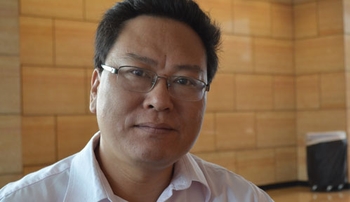We’ve heard much about why it is important for UNMC to establish collaborative relationships with China and others in the international science community. But what about the reverse? Why are China and Chinese scientists excited about collaborating with the U.S. and with UNMC?
 |
Yong Zhao, M.D., Ph.D. |
“Why would a man and woman want to get married?” he said.
Strength in numbers
Later, he would add an allegory. This chair he sat in. One person could probably move it by himself.
“But if we have to move a bigger chair,” he said, gesturing toward the loveseat to his left, “we might need two people. Or four people.
“You have to collaborate,” he said. Science is full of big chairs.
Chinese science grows
And now China is eager to tackle big-chair problems. In the past, people in China didn’t always have enough, Dr. Zhao said. They thought about survival. They were worried about food.
“How can you do research?” Dr. Zhao said. “Now they have the money, financial support. So they want to do this kind of collaboration. It’s a double win, for both sides.”
Both sides of the coin
Dr. Zhao worked at UNMC for several years. Now he’s back home. He’s seen the power of both nations.
China allocates national financial support to send students abroad to learn.
But now China also recruits foreign students to China, too.
More collaboration in the future
Dr. Zhao sees a day when scientists might travel between countries the way we travel between states.
He recalled recently watching a TV show about animal migration. Each of the animals was part of a bigger picture, sharing resources. Each somehow knew instinctively what to do, where to go, in order to survive.
As he watched the show, it struck Dr. Zhao that this was what was happening now in the scientific community. Vast migrations, in which participants are compelled to travel great distances as if pulled by an unseen, unstoppable force.